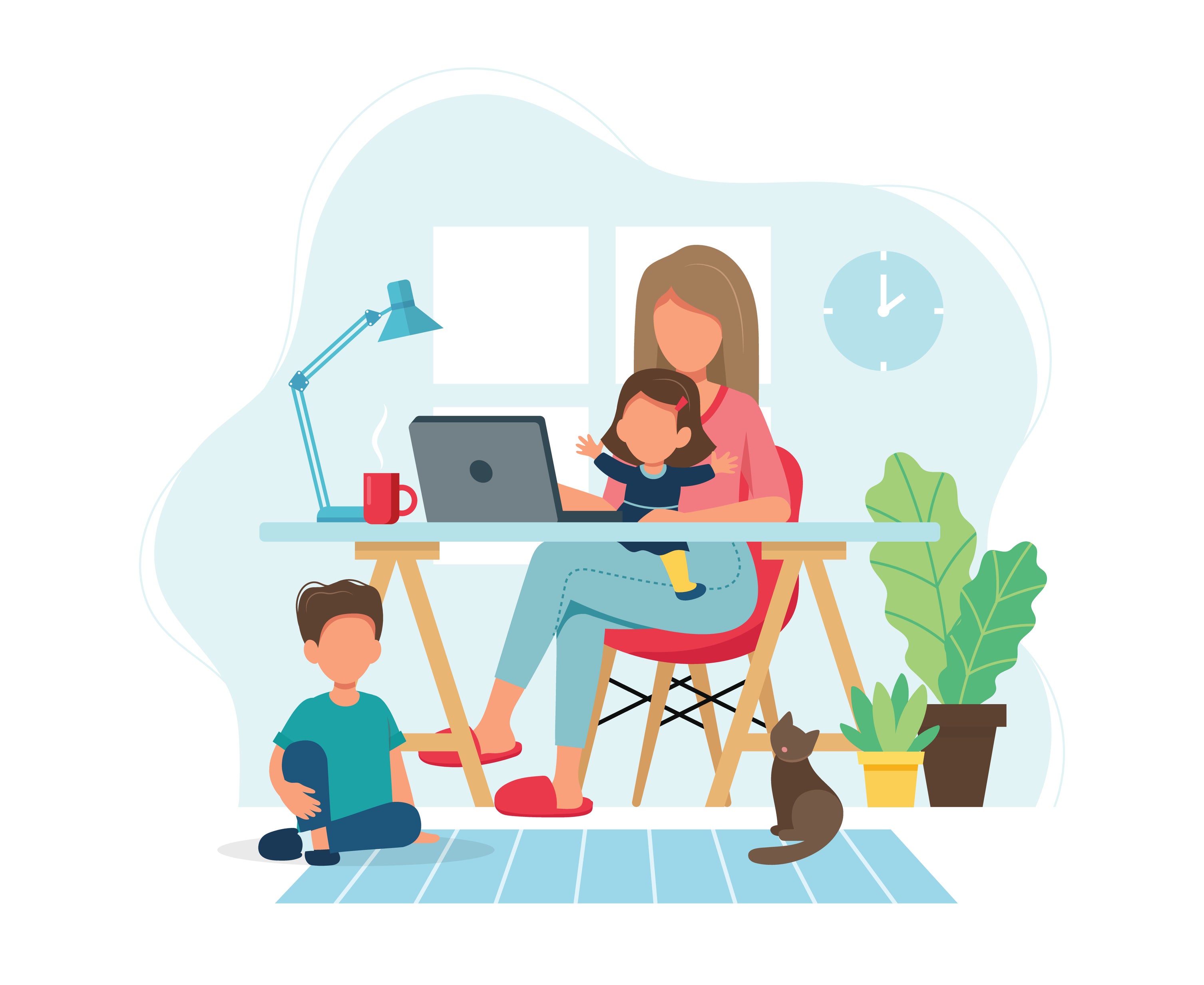Banner artwork by Triative / Shutterstock.com
2,555 days (or seven years)
A lot can happen in seven years! The period between 2014 and 2021 was no exception, with the tail-end abruptly struck by the COVID-19 pandemic, a “once-in-a-century global disaster.”
In 2014 our qualitative research study commenced, focusing initially on exploring attitudes to commercial and corporate law, and the role of legal ethics in the study and practice of this area. A sample of law students and early career commercial lawyers participated in semi-structured interviews or focus groups in the research. In our 2014 study, 48 people participated.
The law students were LLB or JD students from the Australian National University (ANU) or the University of Canberra, along with practical legal training students completing their study at ANU (in Australia all LLB or JD graduates who wish to be admitted to legal practice are required to complete their practical legal training at an accredited provider). The early career commercial lawyers were drawn from private law firms or government legal practice in Canberra, Australia.

The Australian National University (ANU) conducted a research study on graduate law students to determine how life factors affected their legal careers over the span of seven years.

Some participants strongly identified practicing at a top tier corporate firm as the pinnacle of a "successful" legal career. We detailed and explored this theme in peer-reviewed publications.
The dominant theme of what constitutes the pinnacle of career success, intertwined with the ambitions of some of the research participants who aspired to balance family with professional expectations, led the research team to launch stage two of the project. In 2021 the research team contacted the 2014 research participants to reflect back and look forward on factors, forces, and choices shaping life, family, and career paths. Of the 48 participants who volunteered in 2014, 37 consented to participating in 2021.
This article, in the context of in-house corporate and government counsel careers, examines some of the factors that have shaped the family and career paths of some of the research participants from 2014 to 2021. We consider how the ambitions and aspirations of those practicing in-house in 2021 have played out over the previous seven years, referencing perspectives from 2014.
Snapshots over seven years
At the time of the 2014 study, 16 percent of lawyers across Australia were working corporate in-house. The participating lawyers in the 2014 study were drawn almost equally from private practice (53 percent) and government in-house (47 percent). Our findings regarding the perceived ethical duties of corporate and in-house lawyers were published in The Australian Corporate Lawyer 2018.
At the time of our 2021 study, 25 of the 37 returning participants were in legal practice (of the 12 who weren’t in legal practice, four had been in legal practice prior to 2021, before moving to paths outside of law). We saw an increase in the number of our 2014 participants entering in-house corporate practice and a decrease in the number practicing in-house for government. We acknowledge that our cohort of research participants does not strictly align with the experience of the Australia-wide legal profession.
Nevertheless, it is worth comparing these 2021 research figures with the 2020 nationwide statistics. Although another research participant, who was not in legal practice at the time of the 2021 interviews, had been an in-house government counsel for much of the previous seven years. Of the 25 returning participants who were in legal practice, two (eight percent) were practicing as in-house corporate lawyers (compared to 16 percent nationwide), seven (28 percent) in government in-house practices, (compared to 12 percent nationwide), 11 (44 percent) were in private practice (compared to 67 percent nationwide), four (16 percent) in community legal practice (compared to three percent nationwide), and one practiced as a barrister.
The two research participants who were practicing as in-house corporate lawyers in 2021 were in private practice in 2014. The six research participants who were in-house government lawyers in 2021 were already in government practice in 2014. All eight of the in-house counsel in 2021 were females. The 2020 nationwide statistics show that 60 percent of in-house corporate counsel were females, and 40 percent males.
Factors in the path to in-house corporate and government counsel
An overview of practicing as in-house counsel: 2014 to 2021
This student, during the seven years after the 2014 study, spent several years practicing in a government law department, where he gained the opportunity to familiarize himself with his country's legal system and broaden his range of legal experience.
In the 2014 interviews and focus groups, four of the then law students (three male, one female) were open to practicing as in-house counsel as part of their career trajectory options. One male student was interested in working as corporate counsel after gaining experience in a medium-sized firm, with another male student thinking of working in a major federal government department, which he considered as akin to a corporation. We learned in their 2021 interviews that both ultimately went on to practice in senior levels in private practice.

The third male student expressed a desire to work in-house for a government department or statutory authority after gaining experience in a small firm. This student, during the seven years after the 2014 study, spent several years practicing in a government law department, where he gained the opportunity to familiarize himself with his country’s legal system and broaden his range of legal experience.
One of the many positive aspects of being a corporate in-house counsel is the variety of responsibilities such as intellectual property, consumer law, litigation, and contract law.
The female law student (who in 2014 was a legal assistant in a government law department), commented that her ability to maintain work-life balance could influence her decision to consider government in-house counsel, where conditions were seen as more favorable compared to private corporate practice. In 2021 she commented that her government law department employer, with nearly 100 lawyers in-house, has that “big firm feel” that is supportive to work-life balance, compared to the “grind and the grunt work and the many, many hours” that her counterparts in private practice are expected to work.
While no other law students in the 2014 focus groups and interviews specifically flagged working in-house as part of their career journey, several female students were conscious of seeking out an accommodative work environment. The comment of one student, that there was “no way” she could be “at a large private law firm and try to be a mom,” encapsulated the appeal other legal career options had for female lawyers seeking to preserve their parenting responsibilities while practicing law.

Another female law student from the 2014 interviews noted that being a parent will play a key role in determining career choices. By the time of the 2021 round of interviews, that student was an in-house corporate counsel for a global manufacturer, building on her extensive experience in big law practice and in-house government counsel. The corporate counsel mentioned that one of the many positive aspects of being a corporate in-house counsel is the variety of responsibilities such as intellectual property, consumer law, litigation, and contract law.
Work-life balance, parenting, and legal careers
The unhealthy competitiveness that this corporate counsel faced in private practice was a welcome absence from her in-house position. The impact of COVID-19 led to changes in the manner she and her colleagues worked, with working from home being more broadly accepted. Compared to the in-house counsel’s time in private practice, she found the corporation’s work-life balance much more supportive of women, particularly with respect to parental leave. This was especially applicable during the 2021 interview because she was expecting a baby.
The theme of balancing parental responsibilities with a legal career was a significant thread for one of the female lawyers in the longitudinal research. Being an early career lawyer in private practice when interviewed in 2014, she commented that work-life balance included working for an employer with “good maternity leave.” In the years leading up to the 2021 interview, the participant rose through the ranks in her corporate law firm, before the fallout from COVID-19 led to her being laid off from the firm.

Compared to the in-house counsel’s time in private practice, she found the corporation’s work-life balance much more supportive of women, particularly with respect to parental leave.
mentalmind / Shutterstock.com

In her 2021 interview, the lawyer recounted that the impact of the pandemic on her career was ultimately a “fortunate turn of events” because soon after she departed the firm, she was recruited by a financial institution as an in-house corporate counsel. She believed that while private practice was compatible with raising a family, she found that her litigation responsibilities in the firm “wasn’t really ideal,” due to her travel requirements to attend interstate court hearings, balanced with raising a young child, and expecting another child.
She also observed that a female lawyer in private practice is “treated differently as a woman and a mother” because male counterparts are “available 24/7” for the firm. This was despite the firm’s outward posturing support for lawyers seeking to raise a family. Being an in-house corporate counsel, the lawyer found the corporation was “a lot more family friendly,” with the ability to take adequate parental leave to have her second baby.
The counsel enjoyed the in-house work, particularly as she wasn’t required to “bill crazy hours or be there till 9 o’clock,” with the employer being more respectful of her time and her as a person.
She also observed that a female lawyer in private practice is "treated differently as a woman and a mother" because male counterparts are "available 24/7" for the firm.
The sentiments of this in-house counsel were reflected in the attitudes of three female participants in the research, all of whom were government in-house counsel throughout the seven-year period from 2014 to 2021 and who had become parents by the time of the 2021 research interviews. One of the counsel, who advised on multi-million dollar commercial projects, thought that government legal practice is a good place to be “if you’re having a family.”
The in-house counsel was thankful to experience the benefit of “very good paid maternity leave” and achieving work-life balance by working from home, including working part-time. One downside of working from home was the risk of “proximity bias.” This is where managers prefer “employees who are in their immediate vicinity” i.e., physically in the office, which could lead to “entrenching systematic gender bias unless carefully managed.” This is an avenue requiring further enquiry.

It is worth comparing these experiences with the work-life balance perspectives of two other female participants, both of whom moved from in-house government counsel to big corporate firms between 2014 and 2021. A significant driving factor for one of the lawyer’s move to private practice was to be closer to family in her home city. She observed that most of the female lawyers in her firm who had children ended up leaving the firm. The lawyer attributed this primarily to the work environment that required quick work turnaround, making it challenging for the female lawyers who, for example, took even just a day from work to look after their sick child.
Unfortunately, this led to assumptions amongst the male dominated leadership that the male lawyers, most of whom had spouses or domestic partners to look after their children, were more able to meet the rapid demands of the clients.
Perhaps unsurprisingly, this lawyer returned to government in-house practice, because she and her husband were thinking about starting a family, with a government practice providing more family support. Interestingly, she soon found that while her government practice’s tight timeframes (based on major construction projects) was not entirely conducive to work-life balance, it was better than the work-life offered in her previous law firm whose purported campaigns for women’s progression failed to match the reality.
The in-house counsel was thankful to experience the benefit of "very good paid maternity leave" and achieving work-life balance through WFH, including working part-time.
The experiences of this lawyer was similar to the second lawyer who also moved from in-house government practice to a big corporate law firm. The latter, who moved across with her government practice supervisor to private practice, observed her firm’s lack of sincerity in their efforts to promote females lawyers who choose to work part-time or are about to take maternity leave. Nevertheless, she was able to benefit from her firm’s flexible working arrangements to raise her child.
Looking ahead: The next three years
The analysis of our 2014 and 2021 interviews indicate that factors such as work-life balance (especially parenthood for females) and career satisfaction were constant factors in driving the paths of the lawyers shifting from private practice to in-house corporate counsel. These factors are also particularly applicable to the 2014 research participants who continued practicing as in-house government counsel, and who became parents by the time of their 2021 interview.
While the impact of COVID-19 was disruptive on the career trajectory of some of the research participants, if anything its impact was serendipitous on one of the lawyers, who transitioned to a corporate in-house role that was compatible with her priorities as a mother and lawyer raising young children. Given the worldwide disruption of COVID, surprisingly only three of the participants in the 2021 interviews had careers that were adversely impacted (albeit only temporarily) by the pandemic.
We look forward to conducting a third stage of interviews in 2024, the 10th anniversary of the research project, where we can identify any further shifts of attitudes to corporate or government in-house practice, and the influence of factors such as parenthood, family, and career aspirations have on such transformations.






